place的过去分词
新概念一册lesson_143课
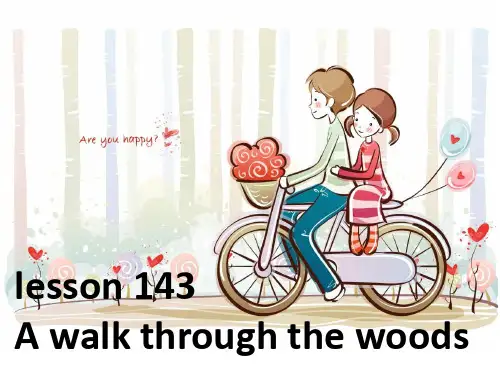
• • • • • • • • • • • •
1)表示位置,在…之中,在…各处 地球在宇宙之中运动。 The earth moves through space. 2)表示时间,在…期间 我们从周二到周五会在纽约 We'll be in New York Tuesday through Friday. 3)表示方向,从…的一端到另一端 第二天他穿过了树林。 He went through the forest next day. 5)表示方式,凭借,用 我是通过报纸的广告了解到这个职位的。 I learnt of the position through a newspaper advertisement.
over :‘越过,翻越过去’ e.g.1)After they climbed over the hill they found many flowers in the fields. 2) They can’t climb over the mountain if they can’t keep going.
litter basket
★ place放,地方 Place the books on the desk. He placed the books in the right order. 他把书本按正确的顺序放好。
★ throw v. 扔,抛 threw;thrown throw away My brother is throwing a ball. Please throw. I’ll catch. throw sb. sth. = throw sth. to sb.
课文讲解
• I live in a very old town which is surrounded by beautiful woods. • Be surrounded by 四周环绕着 • 我住在一个四周围绕着高楼的地方。 • I live in a place which is surrounded by tall buildings. • 我住在四周围绕着山的小村中。 • I live in a village which is surrounded by hills.
高考题中的“情态动词+have+过去分词”结构
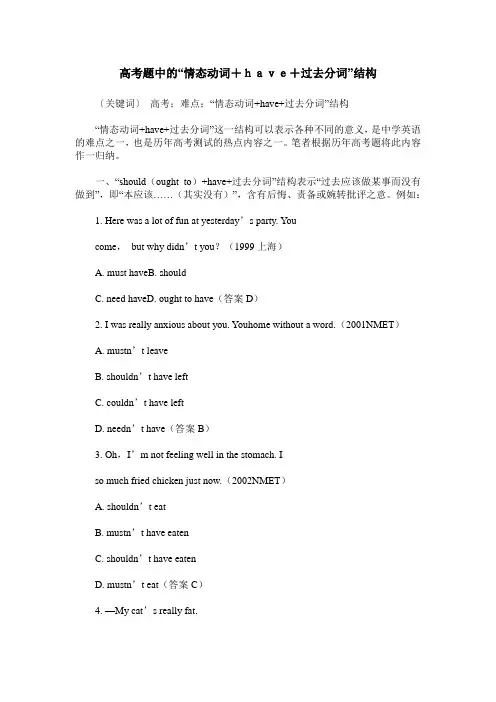
高考题中的“情态动词+have+过去分词”结构〔关键词〕高考;难点;“情态动词+have+过去分词”结构“情态动词+have+过去分词”这一结构可以表示各种不同的意义,是中学英语的难点之一,也是历年高考测试的热点内容之一。
笔者根据历年高考题将此内容作一归纳。
一、“should(ought to)+have+过去分词”结构表示“过去应该做某事而没有做到”,即“本应该……(其实没有)”,含有后悔、责备或婉转批评之意。
例如:1. Here was a lot of fun at yesterday’s party. Youcome,but why didn’t you?(1999上海)A. must haveB. shouldC. need haveD. ought to have(答案D)2. I was really anxious about you. Youhome without a word.(2001NMET)A. mustn’t leaveB. shouldn’t have leftC. couldn’t have leftD. needn’t have(答案B)3. Oh,I’m not feeling well in the stomach. Iso much fried chicken just now.(2002NMET)A. shouldn’t eatB. mustn’t have eatenC. shouldn’t have eatenD. mustn’t eat(答案C)4. —My cat’s really fat.—You have given her so much food.(2007浙江)A. wouldn’tB. couldn’tC. shouldn’tD. mustn’t(答案C)5. I told your friend how to get to the hotel,but perhaps Ihave driven her there.(2007陕西)A. couldB. mustC. mightD. should(答案D)二、“must+have+过去分词”结构表示对过去发生的事情肯定的推测或者推论,只用在肯定句,含有一定、准是的意思。
第13讲 非谓语动词:过去分词(练习)(解析版)
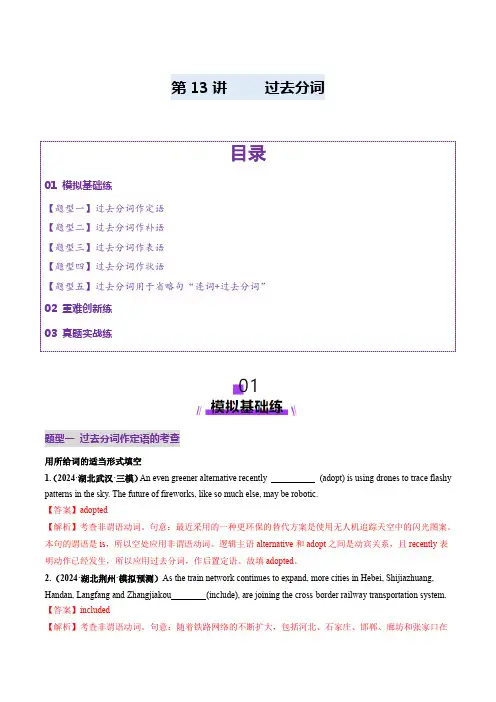
【解析】考查非谓语动词。句意:这些文物已于周一移交给国家文物局,这是近年来台湾最大的文物归还行动。由该句谓语为marked可知,此处为非谓语动词,作后置定语,修饰They,They和transfer为被动关系,应用过去分词。故填transferred。
5.(2024·山西太原·一模)Greek fairy tales also presented dragonsasviolent sea monsters or guards of valuablepossessions. By contrast, “loong”, a word______(create) in the 19th century, reminds people of strength and fortune, and shouldbedistinguishedfrom its Western cousin.
【答案】recorded
【解析】考查非谓语动词。句意:中国有近5000年的历史记载。分析句子成分可知,空处为定语修饰空后的名词“history”,动词record和名词history之间是被动关系,应该用过去分词。故填recorded。
题型二
用所给词的适当形式填空
1.(2024高三·湖北随州·阶段练习)The ageing of China s population is becoming increasing evident, with the number of people aged 60 or above(expect) to reach 300 million by 2025.
【答案】glued
【解析】考查非谓语动词。句意:他的一些较大的艺术品是由7000到8000张纸制成的,所有的纸都是手工在特定的点上小心地粘在一起,形成一个可以移动、弯曲r构成被动关系,故用过去分词。故填glued。
必修5 unit2 语法:过去分词做宾语补足语
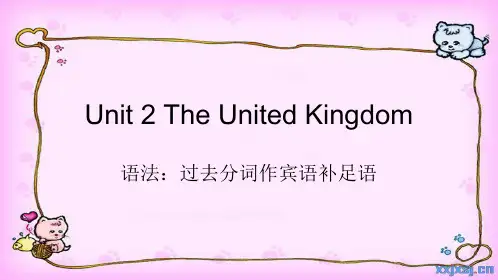
(3)分词作宾补表示宾语的状态,而不表示被动意义,如 seat, hide, dress等词的过去分词。
When I came in, I found a strange girl seated in the corner. As soon as the boy got himself dressed, he went out.
2.Listen! Do you hear someone ________ for help? A. calling B. call C. to call D. called
2.使役动词make, have, get和keep, find后宾语补足语 的比较 (1)make+宾语+do sth.
He got me to post the letter for him. 他让我替他寄信。 Let me try now. I will get the car going. 现在让我试试, 我会把汽车发动起来的。 You must get the work done before Friday. 你必须在 周五前把工作完成。
(2)分词作宾补仅仅表示动作已经完成,如go, change, fall等的过去分词。
She found her necklace gone on her way home. 她在回家的路上发现项链丢了。
He found the place much changed.
他发现这个地方有了巨大的变化。
Don’t have the water running. We had the machine mended just now. 我们刚才请人把机器修好了。
(3) get+宾语+宾语+doing sth. 使……开始做某事
过去分词用法详解
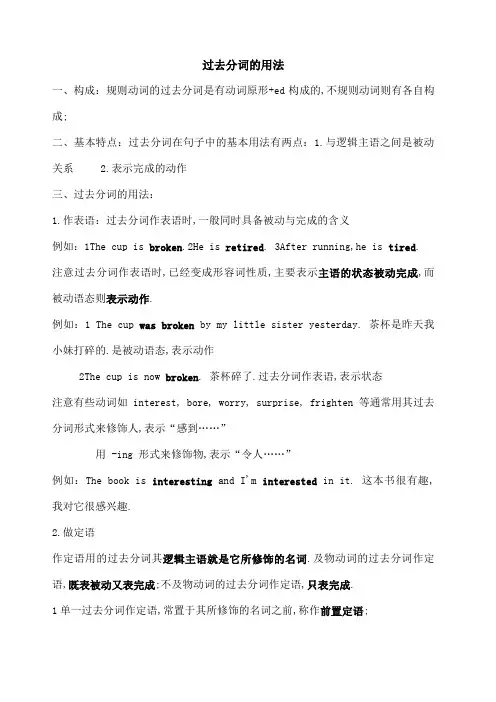
过去分词的用法一、构成:规则动词的过去分词是有动词原形+ed构成的,不规则动词则有各自构成;二、基本特点:过去分词在句子中的基本用法有两点:1.与逻辑主语之间是被动关系 2.表示完成的动作三、过去分词的用法:1.作表语:过去分词作表语时,一般同时具备被动与完成的含义例如:1The cup is broken.2He is retired. 3After running,he is tired. 注意过去分词作表语时,已经变成形容词性质,主要表示主语的状态被动完成,而被动语态则表示动作.例如:1 The cup was broken by my little sister yesterday. 茶杯是昨天我小妹打碎的.是被动语态,表示动作2The cup is now broken. 茶杯碎了.过去分词作表语,表示状态注意有些动词如 interest, bore, worry, surprise, frighten 等通常用其过去分词形式来修饰人,表示“感到……”用 -ing 形式来修饰物,表示“令人……”例如:The book is interesting and I'm interested in it. 这本书很有趣,我对它很感兴趣.2.做定语作定语用的过去分词其逻辑主语就是它所修饰的名词.及物动词的过去分词作定语,既表被动又表完成;不及物动词的过去分词作定语,只表完成.1单一过去分词作定语,常置于其所修饰的名词之前,称作前置定语;例如:We must adapt our thinking to the changed conditions. 我们必须使我们的思想适应改变了的情况.2过去分词短语用作定语时,一般置于其所修饰的名词之后,相当于一个定语从句,称作后置定语;例如:The concert given by their friends was a success.他们朋友举行的音乐会大为成功.3过去分词短语有时也可用作非限制性定语,前后常有逗号.例如:The meeting, attended by over five thousand people, welcomed the great hero.4 用来修饰人的过去分词有时可以修饰与人有关的表情,面貌,举止行为以及感觉等,这时不能用v-ing形式例如:The boy looked up with a pleased expression. His satisfied look showed that he had passed this exam.3.作状语作状语的过去分词在句子中多表示被动和完成两重含义;1)时间状语:A.当和谓语动词动作同时发生时,一般仅表示被动,可以用when从句代替;例如:Faced with difficulties,we shouldn’t withdraw for any excuse.B.当表示动作发生在谓语动词之前时,通常既表被动又表完成,可用after从句代替,也可用现在分词的被动完成形式代替;例如:Caught by the police,the thief lay on the ground,crying and shouting. 2原因状语:过去分词所表示的动作多有被动和完成两重含义;例如:Written in a hurry, this article was not so good 因为写得匆忙,这篇文章不是很好.Welcomed by all the students,we expressed own true thanks to them.被全体同学欢迎,我们表达真挚的感激注意有些过去分词因来源于系表结构,作状语时不表被动而表主动.这样的过去分词及短语常见的有:lost 迷路; seated 坐; hidden 躲; stationed 驻扎; lost / absorbed in 沉溺于; born 出身于; dressed in 穿着; tired of 厌烦. 等,这种结构可以改写成一个because引导的主系表结构句子;例如:Lost / Absorbed in deep thought, he didn't hear the sound.因为沉溺于思考之中,所以他没听到那个声音.Tired of the noise,he decided to move to the country.因厌倦了噪音,他决定搬到农村去;Dressed in an orange dress,she looked more beautiful than before.穿上橘红色连衣裙,她看起来比以前更美3条件状语:作条件状语时,一般只表被动含义;相当于if引导的条件状语从句; 例如:Grown in rich soil, these seeds can grow fast. 如果种在肥沃的土壤里,这些种子能长得很快.4伴随情况:表示伴随谓语动词发生的另外动作,位于主语之后,用逗号隔开,可以同时表示被动与完成,例如:The mother ran across the street,followed by her little son.5结果状语:表示发生在谓语动词后的动作,位于主句后用都逗号分开,也可以同时表示被动与完成;例如:He listened to the hero’s story,moved to tears.注意状语从句改成过去分词作状语时有时还可保留连词,构成"连词+过去分词"结构作状语.例如:When given a medical examination, you should keep calm. 当你做体格检查时要保持镇定.After seated in the sofa,he bagan to feel comfortable. If permitted,he was sure to come with us.4.作宾语补足语:常见的带过去分词作宾补的动词有两类:1感官动词.如:see, watch, observe, look at, hear, listen to, feel, notice, think等.例如:I heard the song sung in English. He found his hometown greatly changed.2使役动词.如:have, make, get, keep, leave等.例如: I'll have my hair cut tomorrow. 明天我要理发. Don't leave those things undone. 要把那些事情做完.注意:使役动词have接过去分词作宾补有两种情况.1 过去分词所表示的动作由他人完成. 例如: He had his money stolen.他的钱给偷了.被别人偷去了2 过去分词所表示的动作由句中的主语所经历.如: He had his leg broken.他的腿断了. 自己的经历5."with +宾语+过去分词"结构"with +宾语+过去分词"结构中,过去分词用作介词 with的宾语补足语.这一结构通常在句中作时间,方式,条件,原因等状语.例如:1 The murderer was brought in, with his hands tied behind his back. 凶手被带进来,他的双手被绑在背后.表方式2 With water heated, we can see the steam. 水一被加热,我们就会看到水蒸气.表条件3 With the matter settled, we all went home. 事情得到解决,我们都回家了.表原因4 She stood in front of him, with her eyes fixed on his face. 她站在他面前,眼睛注视着他.表伴随5 He stood for an instant with his hand still raised. 他仍然举着手站了一会儿. 表伴随分词使用技巧一、现在分词和过去分词的两大区别:1. 现在分词与过去分词的最大差别在语态上:现在分词表主动,过去分词表被动;2. 现在分词与过去分词的第二大差别在时态上:现在分词表进行,过去分词表完成;二、现在分词和过去分词的逻辑主语逻辑主语就是与分词具有主、被动关系的名词或代词;它既可能是句子主语,又可能是句中宾语,或者是句中的表语不要理解成句子主语;它既可能是动作行为的发出者,也有可能是动作行为的承受者;如果是动作的发出者,与分词构成主谓关系;如果是动作的承受者,与分词构成动宾关系;1作状语时Seeing the teacher come in, all the students stood up. the students 是seeing的逻辑主语,主谓主动关系Heated, the metal expands. the metal是 heated的逻辑主语,动宾被动关系结论:分词作状语,其逻辑主语是句子主语;2作宾补时I saw him reading last night. him 是reading的逻辑主语,主谓主动关系 His wife found his hair dyed black. hair是 dyed的逻辑主语,动宾被动关系结论:分词作宾补,其逻辑主语是句子宾语;3作表语时The film is moving. the film是 moving的逻辑主语,主谓主动关系The visitors looked surprised. the visitors是surprised的逻辑主语,动宾被动关系结论:分词作表语,其逻辑主语是句子主语;4作定语时This is an interesting book. book是 interesting的逻辑主语,主谓主动关系The moved children looked serious. children是 moved的逻辑主语,动宾被动关系结论:分词作定语,其逻辑主语是被修饰词即中心词;5用于复合结构中时即在独立主格中与with复合结构中With the task completed, we went out to take some fresh air. task 是completed的逻辑主语,动宾被动关系Weather permitted,we’ll go skiing this Sunday. Weather是permitted 的逻辑主语,动宾被动关系结论:分词用于复合结构,逻辑主语是复合结构中的逻辑主语三、确定分词的使用的具体步骤:1、确定分词的语法成分2、找准逻辑主语3、判断主、被动关系4、选定现在或过去分词一、分词选择填空练习1. All things ____, the planned trip will have to be called off.A consideredB be consideredC consideringD having considered2. The house was very quiet, ____as it was on the side of a mountain.A isolatedB isolatingC being isolatedD having been isolated crop has similar qualities to the previous one, ____both wind-resistant and adapted to the same type of soil.A beingB beenC to beD having beenoriginated in the New World and thus was not known in Europe until Columbus found it ____ in Cuba.A being cultivatedB been cultivatedC having cultivatedD cultivating5. ____in this way, the situation doesn't seem so disappointing.A To lookB Looking atC Looked atD To be looked at6. You will see this product ____ wherever you go. A to be advertised B advertised C advertise D advertising7. ____in a recent science competition, the three students were awarded scholarship totaling 21,000 dollars.A To be judged the bestB having judged the bestC Judged the bestD Judging the best8. From the dates ____ on the plates, we decided that they were made in Song Dynasty.A markingB having been markedC markedD to be marked9. ____ to meet anybody, he went in from the back Not wishing B WishingC Not wishedD No wishing10. The editorial ____ now will appear in tomorrow's newspaper.A writingB to writeC being writtenD write11. ____ with the size of the whole earth, the highest mountain does not seem high at all.A When comparedB While comparingC CompareD Comparing12. The old man came upstairs with great strength, his right hand ____ a stick for support.A heldB holdingC being holdingD was holding13. ____ three times in a row, the boxer decide to give up fighting.A having defeatedB To have defeatedC having been defeatedD To have been defeated14. ____neglecting our education, my father sent me to school.A Accused ofB Accusing ofC To be accused ofD That he was accused of15. ___ mainly for the invention of the telephone, Alexander Graham Bell devoted his life to helping the deaf.A He is rememberedB While being rememberedC To be rememberedD Though remembered16. ___ on a clear day, far from the city crowds, the mountains give hima sense of infinite peace.A If walkingB While walkingC WalkingD When one is walking17. A cool rain was falling, ___ with snow. A mixed B mixing C to mix D having mixed18. ____ by the police, the kidnappers had no choice but to surrender.A SurroundedB SurroundingC having surroundedD To be surrounded19. All the exam papers ____, the teacher sent the class home.A having been handed inB having hands inC handing inD being handed in20. ____ in 1636, Harvard is one of the most famous universities in the United States.A FoundingB It was foundedC Being foundedD Founded21. There ____ no fresh drinking water and no good farm land, it was nota comfortable place in which to live.A beB wasC wereD being22. ___ in Beijing for quite a few years, Mr. Park had little difficulty understanding Chinese.A having livedB LivedC LivingD To live23. Any packet ____ properly will not be accepted by the post office.A not to be wrappedB not being wrappedC not wrappedD not having been wrapped24. The lab ____ next year will be more advanced than the old one.A builtB to be builtC being builtD to build25. Anna was reading a piece of science fiction, completely ____ to the outside world.A being lostB losingC having lostD lost二、翻译句子练习:根据过去分词的用法翻译下列句子1.你认识那个穿着红衣服的妇女吗______________________________________________________________________ ____________________2.舒服地坐在椅子上,他在沉思.______________________________________________________________________ ___________________3.对于昨天发生的事故,我很震惊._________________________________________________________________________________________4.给予更多的关心的话,这些树会长得更好.______________________________________________________________________ ___________________5.他作了自我介绍,以便使自己被大家认识.______________________________________________________________________ ___________________6.昨天,我把衣服让人洗了.______________________________________________________________________ ___________________7.上周一,我看到你兄弟被一个陌生人打了.______________________________________________________________________ ___________________8.将书合上背诵这篇课文.______________________________________________________________________ ___________________9.我提高了声音以便使自己被听见.______________________________________________________________________ ___________________10.如果被问及,你不要说我在家里.______________________________________________________________________ ___________________11.你参加了昨天举行的会议吗______________________________________________________________________ ___________________12.从日本引进的这些种子已经坏了.______________________________________________________________________ ___________________13.我想把这封信寄出去.______________________________________________________________________ ___________________14.女工人将头发扎在后面来上班.______________________________________________________________________ ___________________15.我们没有足够的食物吃的日子一去部复返了.______________________________________________________________________ ___________________16.我们必须适应改变了的形式.______________________________________________________________________ ___________________17.用所给的动词写出两个句子.______________________________________________________________________ ___________________18.他们在看足球比赛,兴奋而又满意.______________________________________________________________________ ___________________19.他说爬山很累.但是我一点也不累.______________________________________________________________________ ___________________20.即使在森林里迷路了,他也不担心.______________________________________________________________________ ___________________。
【英语】非谓语动词易错题及解析
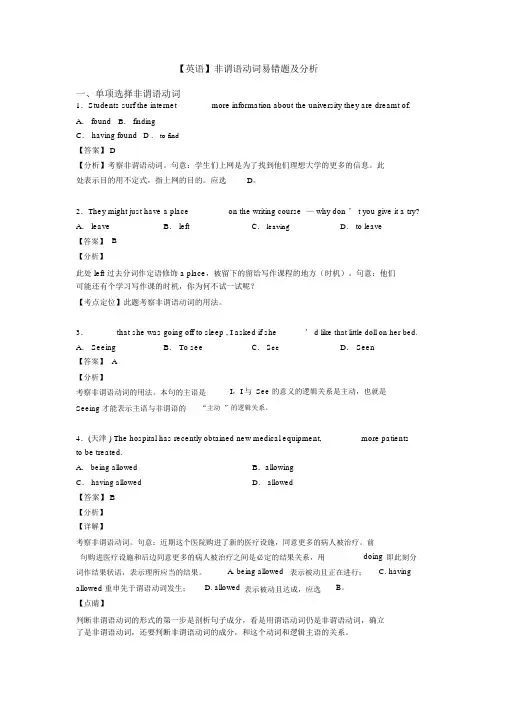
【英语】非谓语动词易错题及分析一、单项选择非谓语动词1.Students surf the internet _______ more information about the university they are dreamt of. A. found B. findingC. having found D . to find【答案】 D【分析】考察非谓语动词。
句意:学生们上网是为了找到他们理想大学的更多的信息。
此处表示目的用不定式,指上网的目的。
应选D。
2.They might just have a place ________ on the writing course — why don ’ t you give it a try? A. leave B. left C. leaving D. to leave【答案】B【分析】此处 left 过去分词作定语修饰 a place,被留下的留给写作课程的地方(时机)。
句意:他们可能还有个学习写作课的时机,你为何不试一试呢?【考点定位】此题考察非谓语动词的用法。
3.______ that she was going off to sleep , I asked if she A. Seeing B. To see C. See ’ d like that little doll on her bed.D. Seen【答案】A【分析】考察非谓语动词的用法。
本句的主语是I,I与See 的意义的逻辑关系是主动,也就是Seeing 才能表示主语与非谓语的“主动”的逻辑关系。
4.(天津 ) The hospital has recently obtained new medical equipment, ________ more patients to be treated.A. being allowed B.allowingC. having allowed【答案】 BD. allowed【分析】【详解】考察非谓语动词。
过去分词及现在分词被动式的区别
过去分词与现在分词被动式的区别(1)过去分词在构成完成时态,不定式完成式以及被动语态时,通常不能用现在分词一般被动式代替。
(现在进展时的被动语态除外)eg:The door was closed an hour ago.这门在一小时前就关闭了。
They have finished their homework。
他们已经做完了家庭作业(2)过去分词作前置定语时,不能用现在分词一般被动式代替。
eg:That was an inspired suggestion.那是一条由某人提出的建议。
同样现在分词一般被动式作为定语表示动作时,也不能用过去分词来代替。
eg:The house being built is a big project.正在施工的那幢楼是一项大的工程。
(3)过去分词作条件、时间等状语时,不可用现在分词一般被动式代替。
eg:Given more time,I can do it better.(表条件)多给点时间,我会做得更好些。
Given more attention,the trees could have grown better.(MET 90)(表示条件)如果多关心一些,这些树会长得更好。
Heated ,the metal expands.(表示时间)加热后,这种金属会膨胀。
Asked why he did it,he said it was his duty .(表示时间)问及为何要做此事时,他说这是他的职责。
(4)过去分词作表语时,不能用现在分词一般被动式代替。
eg:The top of the mountain is covered with snow .山顶满是雪。
(5)过去分词在构成have,get,want等动词后的复合宾语时,不能用现在分词一般被动式。
eg:Why don’t you have the radio fixed?你为什么不把收音机拿去修一修?尤其是一些感官动词,如:see,hear,find等后构成复合宾语时,过去分词和现在分词一般被动式意思完全不同。
过去式和过去分词[全套][整理]
I have been up to study these days.
出了什么事? What’s up? What’s happening?
be up to sb1某人的责任,义务2由某人决定 1. It’s up to me to do what I can to help you.
It’s not up to you to tell me how to run a computer.
=There is hardly anything left to eat.
Nearly five thousand people died in this war.
in terms of 就某方面来说
我们都认为他在办事能力很强。
Ginza 银座
All of us think he is great in terms of his working ability.
It’s nice to meet you.
=is
We’ve got a plane to catch. =have
A :It’s been a long time. B: It sure has. = has
It’s been nice talking to you. I’ve enjoyed talking to you ,too.
Have you ever been to Chicago now? It’s been nice talking to you.
过去分词作宾语补足语
过去分词作宾语补足语概念引入上个单元我们学习了过去分词作表语和定语的用法。
现在我们继续学习过去分词作宾语补足语。
看这些句子:1. Now when people refer to England you find Wales included as well.2. Finally the English government tried in the early twentieth century to form theUnited Kingdom by getting Ireland connected in the same peaceful government.3. You find most of the population settled in the south.4. They found the window broken.5. ..., so Pingyu had a photo taken standing on either side of the line.这些句子中的黑体部分都是过去分词作宾语补足语。
用法讲解宾语补足语是同学们学习英语的一个小难点,许多同学都弄不清到底什么是宾语补足语,它的作用是什么,所以我们今天就从宾语补足语讲起,重点讲解过去分词作宾语补足语的内容。
什么是宾语补足语英语中一些动词除需要一个宾语外,还需有宾语补足语句子意义才完整,这样就构成了英语的六种基本句型(见【补充】)中的“主语+谓语+宾语+宾语补足语”句型。
宾语与宾语补足语之间在逻辑上是主谓关系。
可作补足语的结构有名词、形容词、副词、介词短语、动词-ing形式、过去分词、不定式等。
宾语和其宾语补足语也被称为复合结构。
1. 作补足语的词语:1)We consider him (to be) a good teacher. 我们认为他是一个好老师。
(名词短语作宾语补足语,相当于省略了to be)2)I find learning English difficult. 我发现学英语很难。
英语非谓语动词用法详解
英语非谓语动词用法详解一、单项选择非谓语动词1.The rainforest is an amazing place, ________ with plants and animals that aren’t found anywhere else in the world.A.filling B.filledC.being filled D.to fill【答案】B【解析】考查非谓语动词。
句意:热带雨林是一个令人惊讶的地方,充满了世界其他地方不能找到的动植物。
固定词组:be filled with被……充满,此处place和fill之间是一种被动关系,所以用过去分词做伴随状态,故选B。
2.Walter offered us a lift when he was leaving the office, but our work _______, we refused his offer.A.not finishing B.had not been finishedC.not having finished D.not finished【答案】D【解析】试题分析:在这里,our work处在逗号位置,作整个句子的原因状语,这里应填非谓语动词。
work和finish存在逻辑上的被动关系,所以应该用过去分词,故选D。
考点:独立主格结构的考查点评:独立主格结构(Independent Genitive)由两部分组成,前一部份是名词或者代词,后一部分是非谓语动词(不定式、动名词和分词)或形容词、副词、或介词短语。
前后两部分具有逻辑主谓关系。
独立主格结构在句中做状语,多用于书面语。
独立主格结构本身不是句子,在句子中作状语,表示时间、原因、条件、伴随、目的等。
3.______ to as much English as possible is a good way to learn English well.A.Exposed B.Being exposed C.Having exposed D.To expose【答案】B【解析】试题分析:句意:尽可能多的接触英语是学好英语的很好的办法。
- 1、下载文档前请自行甄别文档内容的完整性,平台不提供额外的编辑、内容补充、找答案等附加服务。
- 2、"仅部分预览"的文档,不可在线预览部分如存在完整性等问题,可反馈申请退款(可完整预览的文档不适用该条件!)。
- 3、如文档侵犯您的权益,请联系客服反馈,我们会尽快为您处理(人工客服工作时间:9:00-18:30)。
place的过去分词
下面是为你整理的place的过去分词,希望大家喜欢!place的过去分词过去分词:placed过去分词placed造句1. Isabelle placed a wine cup on the table within his reach.伊莎贝尔把酒杯放在桌上他伸手可及的地方。
2. He placed the ball and tried a couple of feints.他把球放好,试着虚打了几下。
3. We had kept its presence hidden with a strategically placed chair.我们用一张摆放得很巧妙的椅子将它隐藏了起来。
4. Stricter controls were placed on the content of video films.对录像片内容实行了更为严格的监管。
5. This was the first object placed in the heavens by the Creator.这是上帝安放在天堂里的第一件东西。
6. The autoexposure button is awkwardly placed under the lens release button.自动曝光按钮安装在镜头脱卸按钮下面,十分不便。
7. Second-placed Auxerre suffered a surprising 2-0 home defeat to Nantes.排名第二的欧塞尔队出人意料地在主场以0比2败给了南特队。
8. She placed her hands palm uppermost in her lap.她把手掌心向上放在大腿上。
9. Miss Parrish recently placed an advertisement in the local news-paper.帕里什小姐最近在本埠报纸上登了一则广告。
10. I placed his drink on the small table at his elbow.我把他的饮料放在他肘边的小桌子上。
place的词语用法n.place是可数名词,基本意思是“地方,场所,所在地,引申可表示“城,村,镇“家,房屋,住所等,也可表示用于某种特殊目的或发生某事的“建筑物,场所,常与介词of搭配使用。
You remember the place we had lunch?More formal: the place we had lunch at?place的常用短语有in place of相当于in stead of,表示“代替。
take the place of也可指“代替,但是“take place表示“发生。
Who will take the place of Mr. James?谁将替代詹姆斯先生?看过“place的过去分词的人还看了:1.shrink的过去分词shrunk, shrunken 的区别2.leap的现在分词、过去式和过去分词3.obey的过去式、过去分词和现在分词4.park的过去式和过去分词5.introduce的过去式和过去分词6.oversleep的过去式和过去分词。
